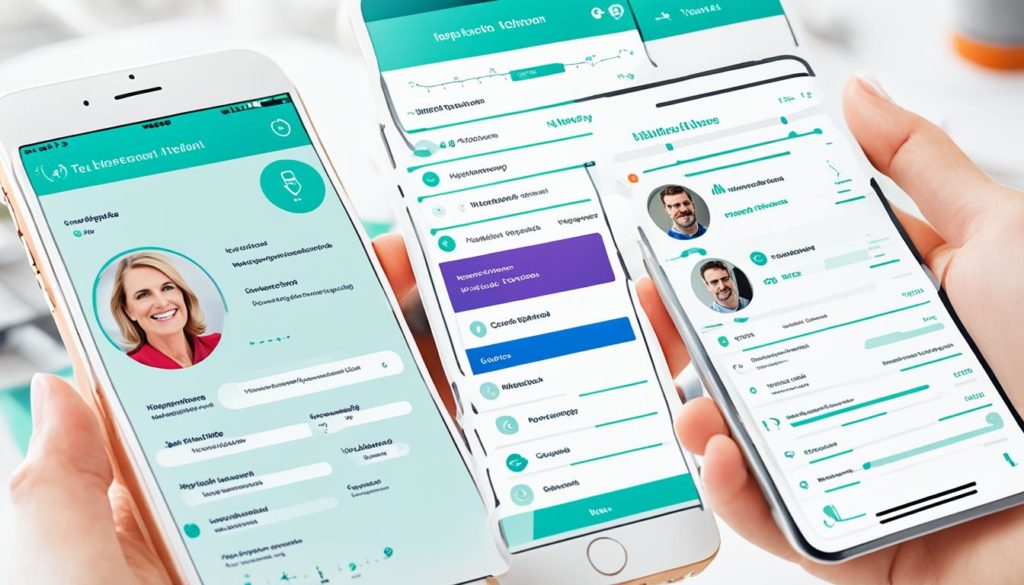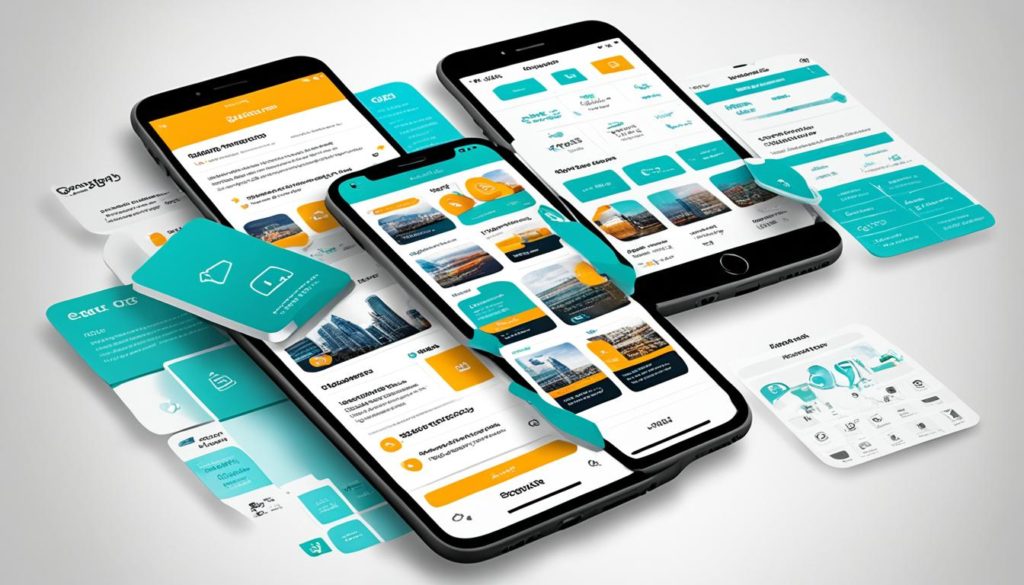
Did you know the healthcare software market might hit USD 77.43 billion by 2032? This growth, at a rate of 10.5% yearly, shows the big changes happening in healthcare technology. We provide advanced digital health solutions. These solutions make healthcare easier to get to and use.
Healthcare mobile app development and telemedicine are about more than convenience. They also make sure apps follow important rules like HIPAA. It’s key to grasp the trends, chances, and hurdles in this growing market. Doing so helps in making the most out of healthcare apps.
Key Takeaways
- The global healthcare software services market is set to reach USD 77.43 billion by 2032.
- Digital health solutions and telemedicine app development are revolutionizing healthcare accessibility and efficiency.
- Compliance with regulations such as HIPAA is a critical aspect of healthcare mobile app development.
- Understanding market trends and challenges is essential for leveraging the potential of healthcare apps.
Understanding the Current Landscape of Healthcare Technology
Healthcare technology is changing quickly, thanks to new digital health solutions and more healthcare software being used. By 2023, the global healthcare market is expected to hit $57.86 billion. It’s estimated to grow to $85.95 billion by 2027. This growth is fueled by technology advancements and big investments in the industry.
Rapid Growth and Market Potential
The healthcare technology market has huge potential. In 2020, businesses and investors put more than $21 billion into digital healthcare. The telehealth sector is growing fast, with an expected CAGR of 24.0% from 2023 to 2030. Plus, there’s been a 60% increase in healthcare app downloads since COVID-19, showing we rely more on digital health now.
There are about 52,565 healthcare apps on the Google Play Store and 51,370 on the Apple App Store as of Q1 2022. These numbers show a big demand for medical app development services. From 2020 to 2028, the global market for healthcare apps is expected to skyrocket from $15.3 billion to $156.9 billion.
Developing healthcare apps has greatly improved patient care. These apps give us tools for things like video doctor visits, scheduling appointments, and managing chronic conditions.
The Role of Technology in Revolutionizing Healthcare
Technology is key to improving healthcare today. It’s all about making care better and easier to get. We’re now using AI, machine learning, and blockchain to help diagnose accurately, create personal treatment plans, and protect our health data.
Telehealth apps let us talk to doctors without traveling. Wearable devices monitor our health in real time. AI is set to make even bigger changes, like predicting diseases and customizing care.
Things like electronic health records and health information exchanges are also making a difference. They help doctors work better together and improve patient care. The future looks bright for healthcare app development, with expected growth of 45% CAGR by 2027.
Interested in healthcare apps?
Key Trends in Healthcare App Development
Healthcare tech is changing fast, bringing new trends in app development. Key advancements include AI and cloud computing. They’re making healthcare easier to manage and improve patient care.
AI-Powered Chatbots and Diagnostic Systems
AI-powered chatbots and diagnostics are changing healthcare apps. Companies like RipenApps Technologies and Fulcrum lead in AI. They’re making diagnosis more accurate and improving patient communication.
AI is growing fast in healthcare. The global telemedicine market will likely reach $286.22 billion by 2030. These changes make healthcare more efficient and widely available.
Cloud Computing Solutions
Cloud computing is another big trend. It’s changing how healthcare organizations keep patient records. By 2026, US healthcare will invest about $29.15 billion in cloud technologies.
Cloud computing, combined with blockchain, ensures data security. It also supports big data analytics. This helps move towards preventive care.
Cloud computing’s role is growing, thanks to mobile health apps. There are over 350,000 mobile health apps now. The mHealth app market might hit $861.40 billion by 2030.
Look at this table for growth forecasts:
| Sector | Market Size (in billion USD) | Year | CAGR |
|---|---|---|---|
| Global mHealth App Market | 861.40 | 2030 | 40.2% |
| Healthcare Market | 974.5 | 2027 | N/A |
| Telemedicine Market | 286.22 | 2030 | N/A |
| Blockchain Healthcare Market | 14.25 | 2033 | N/A |
| Cloud Technologies Investment by US Healthcare | 29.15 | 2026 | N/A |
These trends are creating a better healthcare system for everyone.
Benefits of Mobile Health Apps
Mobile health apps are changing healthcare app development for the better. They make health care more reachable and efficient. With real-time health tracking, patients and doctors get important health info fast. Tools like Fitbit sensors keep track of health and fitness.
Increased Accessibility and Efficiency
Mobile health apps bring amazing convenience. They allow us to meet doctors online, no matter where we are. This is especially good for places with few healthcare services. These apps also cut down on routine paperwork, making healthcare faster and reducing mistakes.
Predictive and Preventive Care
Mobile health apps are key for predictive and preventive health care. They use AI and data analysis to make diagnoses more accurate. For example, these technologies spot health risks early, allowing quick action to prevent illness. So, developing these apps is vital for catching and stopping health problems before they start.
| Feature | Benefit |
|---|---|
| Real-Time Monitoring | Proactive health management |
| Telemedicine | Increased accessibility to healthcare services |
| AI and Machine OLearning | Enhanced diagnostic accuracy and predictive care |
| Automation | Improved efficiency and reduced administrative workload |
Challenges in Healthcare App Development
Healthcare app development holds great potential but faces big hurdles. One main challenge is blending new tech with strong data security. This step is key to keep patient info safe. Plus, creators must follow HIPAA compliance rules strictly. They ensure apps are private and secure.
Another big task is handling personal health info safely. Devs have to keep this data private and unchanged. They also have to fit new tech into old healthcare systems. So, it’s important for healthcare app services to focus on innovation, good user experience, and data security.
Meeting HIPAA compliance demands careful work in building and running the apps. Devs need to regularly update and check security. So, making a good healthcare app means tackling these challenges while adding new, smooth solutions to the mix.
Here is a comparative overview of the key challenges faced:
| Challenge | Key Aspect | Impact |
|---|---|---|
| Data Security | Ensuring protection of patient information | High |
| HIPAA Compliance | Meeting privacy and security standards | High |
| Integration | Aligning new technologies with existing systems | Medium |
| Data Management | Maintaining data integrity and privacy | High |
Fostering Innovation in Healthcare App Development
To bring innovation to healthcare technology, companies are now using a clear, fast process. They are making sure their services meet industry rules. The benefits of making hybrid apps for healthcare are huge. They cost less to make, reach more people, manage health info well, and improve patient care. The market for women’s health apps in the U.S. is expected to grow by 18.3 percent each year. This shows a big demand for new, easy-to-use solutions in this area. Hybrid apps are key in solving many healthcare problems like scattered data, using different platforms, and keeping data safe.
It’s important for healthcare pros, tech experts, and important players to work together. They can make digital health solutions that change and improve how we care for patients. By using new tech like AR/VR and Smart Health Communities, healthcare can go beyond old limits. This leads to better connections and a focus on the patient. The market for mental health apps in North America is seen to grow by 13.2 percent starting 2024. This highlights the ongoing need for new ideas and working together in this area.
Both new and established healthcare businesses should use hybrid app development strategies for new solutions. Health tech is quickly moving to digital, showing how important it is to use these tools. Developers must aim to change how patients are cared for, make things run smoother, and make services easier to access. In 2020, money put into telemedicine, AI, and watching patients remotely went up by nearly 300%. This shows there’s a lot of chances to make a real difference.
FAQ
What is driving the rapid growth in healthcare app development?
The healthcare technology market could hit USD 77.43 billion by 2032. This increase is due to new digital health solutions and telemedicine. These innovations help make healthcare better and more efficient.
How are technologies like AI and machine learning revolutionizing healthcare?
AI and machine learning make diagnosing much more accurate. They also simplify admin tasks and help with decision-making. For example, companies like RipenApps Technologies and Fulcrum are building AI chatbots and diagnostic tools to improve healthcare.
What are the benefits of implementing cloud computing solutions in healthcare apps?
Cloud computing improves how patient records are kept. It allows for better scaling, data integration, and security, especially with blockchain. These are key for safe, fast access to patient information.
How do mobile health apps improve healthcare accessibility and efficiency?
Mobile apps let patients get healthcare remotely. This is great for people in hard-to-reach areas. They also make things more efficient by cutting down on routine work, letting caregivers focus more on patients.
What role do telemedicine apps play in enhancing healthcare delivery?
Telemedicine apps make it easy to have consultations from afar. They help doctors offer care that predicts and prevents health issues no matter where the patient is. This approach saves time and reduces the need to visit doctors in person.
What challenges do developers face in healthcare app development?
Developers deal with many issues like keeping data safe and following HIPAA. They work with new technologies, handle complex data, take care of privacy, and fit their apps into existing healthcare setups.
How do companies foster innovation in healthcare app development?
Companies use clear, quick development methods and invest in the newest tech like AR/VR and Smart Health Communities. They work together with different groups to make apps that really help users and improve patient health.
Future App Studios is an award-winning software development & outsourcing company. Our team of experts is ready to craft the solution your company needs.










